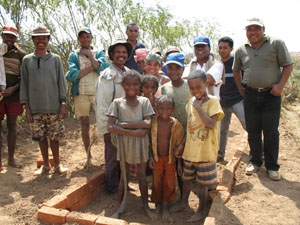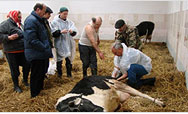You are here » Home » Telling Our Story
Success Story
New method conserves local natural resources, improving livelihoods
Coffee Revives Industry and Forest

Photo: USAID
In Madagascar’s Fianarantsoa region, one of the country’s poorest, USAID support has enabled the revitalization of coffee.
“For us, Corridor Coffee benefits both the environment and trade ... I am convinced that Corridor Coffee will create higher incomes and a hopeful future for our children,” said a coffee farmer from Ambohimanana, Madagascar.
The rural residents of Anjoma-Itsara, a village in Madagascar’s poorest region, depend on traditional subsistence agriculture, often degrading the natural resources that support them. Among the crops grown in this plateau region is arabica coffee, but the industry suffered from unproductive plants, erratic harvests, and unpredictable markets. Deforestation, unstable water supplies and soil degradation created a vicious circle of poverty and environmental destruction.
USAID joined forces with local authorities and farmers to regenerate the coffee industry in the area. Working directly with local producers, the American specialty coffee firm Corridor Coffee and Spices takes a sustainable and quality-focused approach to enhance the quality and reputation of Madagascar’s coffee. New coffee processing and training centers demonstrate and spread new techniques from seed to roasting, including intercropping, composting and the use of shade trees.
Anjoma-Itsara’s small training and demonstration center and local agents are overrun with requests from local farmers who want to tap into the specialty coffee market. This training center has provided high-quality services so that they become self-sustaining. This revitalized coffee trade provides a higher quality coffee, but also restores the natural surroundings. The eco-friendly enterprise reduces pressure on the environment, presenting a clear alternative to widespread destructive practices. Small producers reap economic benefits from a traditional crop while improved cultivation techniques encourage forest preservation.
Today, area coffee growers are producing quality coffee in a way that protects the biodiversity of the neighboring forest corridor. Samples from the region have already scored high marks from international coffee critics.
Print-friendly version of this page (533kb - PDF)
Click here for high-res photo
Back to Top ^
|




